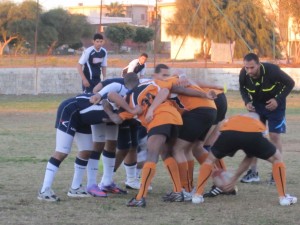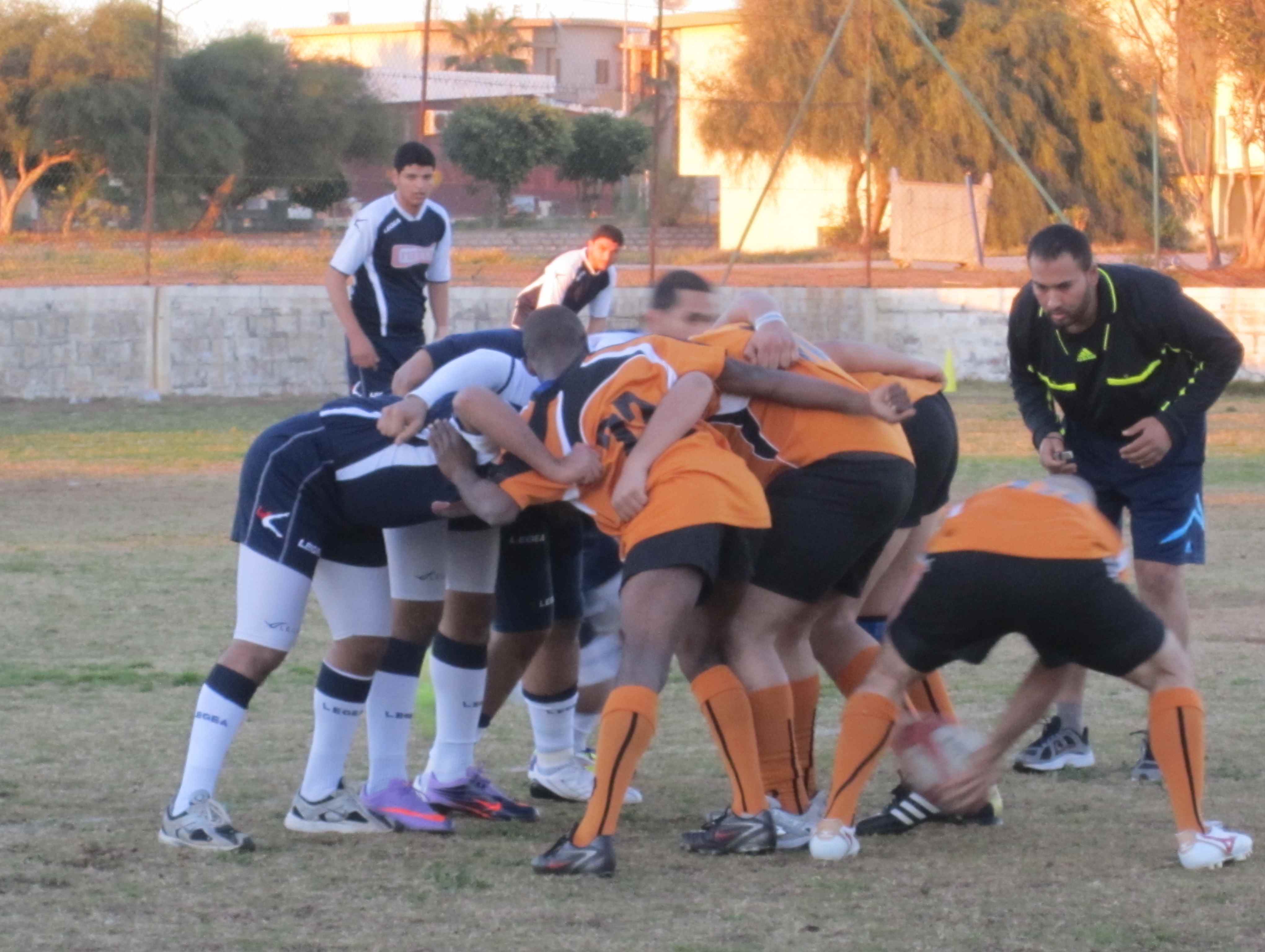
Tripoli, 1 February 2013:
Libyans may be football mad, but there is a small and dedicated band of enthusiasts which hopes that rugby, once, like boxing, illegal in Qaddafi’s time, could become a popular local sport.
Currently there are eight rugby clubs in Libya, which play in seven-a-side leagues, though occasionally full 15-player sides are assembled for friendly games. Benghazi and Tripoli both have four teams, and clubs are currently being formed in Misrata (two), Ajdabia and Zawia.
An enthusiastic spectator said, as he waited for the games to start: “This is a game that is going to grow in Libya. It bonds with the revolutionaries, even if they don’t know it yet. It is a sport that demands individual aggression within strong team work”.
Today, three teams from Tripoli were meeting on a moth-eaten and surprisingly hard football pitch at the Regatta club. The football goal posts had been extended to form a rugby H, though with an unusually low cross bar. Newly-painted white lines marked off the pitch.
The teams, Ahli Tripoli, in green jerseys, Tarsana in orange and Shabab in a blue and white strip were warming up on the pitch or doing impressive stretching exercises and push-ups, in preparation for the three-cornered contest.
Tarek Benrewin, the administrator of both the Tripoli and Libyan rugby committees, busied himself with final preparations for the tournament. The linesmen and referee had driven in from Zawia, and looked on dispassionately as the waiting teams barracked each other in a friendly manner.
Benrewin recalled that the first club in the country, formed in 1997, had been the Tripoli Barbarians, originally with players from Libya, France and England. He had played for them from 2003 to 2008. Because the game was forbidden, matches had to be staged carefully, away from prying eyes and very often on totally unsuitable pitches. In 2007 the Barbarians agreed to go to Benghazi for a match. It was a fixture that ended in a tragedy that might have spelt the end of rugby, in Tripoli at least. The hired minibus in which the Barbarians were travelling collided with a car. Four members of the team were killed and one permanently disabled.
“We had lost half our team” remembered Benrewin sadly. The Tripoli Barbarians were never reformed, but it was agreed that a new side, Tarsana, should be established. In 2008 it was this team that travelled to Benghazi to play a match staged in memory of the dead Barbarian players.
Although Qaddafi lifted his ban on rugby in 2009 and through the Olympic Committee, allowed the setting up of a rugby administration, the organisation was given no budget. Since the revolution, the Olympic committee has given more positive backing to Libyan rugby, to the tune of LD 300,000 a year. However Benrewin pointed out that other sports have received budgets of LD 1.2 million.
Karim Ferjani, general-secretary of the Libyan Rugby Technical Committees explained to the Libya Herald: “We hope there will be a rugby union association next year. We are going to be selecting a 15-man Libyan rugby union team to play against Egypt in Level Three of the Africa Cup later this year. There will also be matches against Algeria and Mauritania.””
Ferjani added: “The game is growing in Libya and by the beginning of new year, rugby will be a lot better known. It is still new. But we are going to make it as public as we can.”
However he said that one major need was for good coaches and well-trained referees.
Today’s tournament in Tripoli began with the match between Tarsana and Ahli. There was some vigorous play and just before the final whistle, one Tarsana player was sent off for swearing. Ahli won the game 12-0.
The Ahli team only had a short break before they again had to take the field, this time against the Shabab team. However once more, their tighter play, good running and better kicking proved a match-winner with the final score also 12-0after two good tries and a conversion. It was left to Tarsana and Shabab to fight it out for the wooden spoon. Shabab showed the greater strength and skill, winning 12-5 .
Meanwhile in Benghazi today, the first round results were Benghazi Al-Jadida 12, Tahady 5; Ahli Benghazi 0 , Hilal 17; Benghazi Al-Jadida 1, Ahli Benghazi 7; Hilal 5, Tahady 7; Hilal 5 Benghazi Al-Jadida 0. Tahady won the deciding match because Ahli Benghazi did not have enough players to continue the game.
The second round of the contest takes place on 8 February with matches in Tripoli and Benghazi. The third and final round will see the two top teams from each city meet on 8 March.
The Libyan rugby season runs between October and May.
[/restrict]











